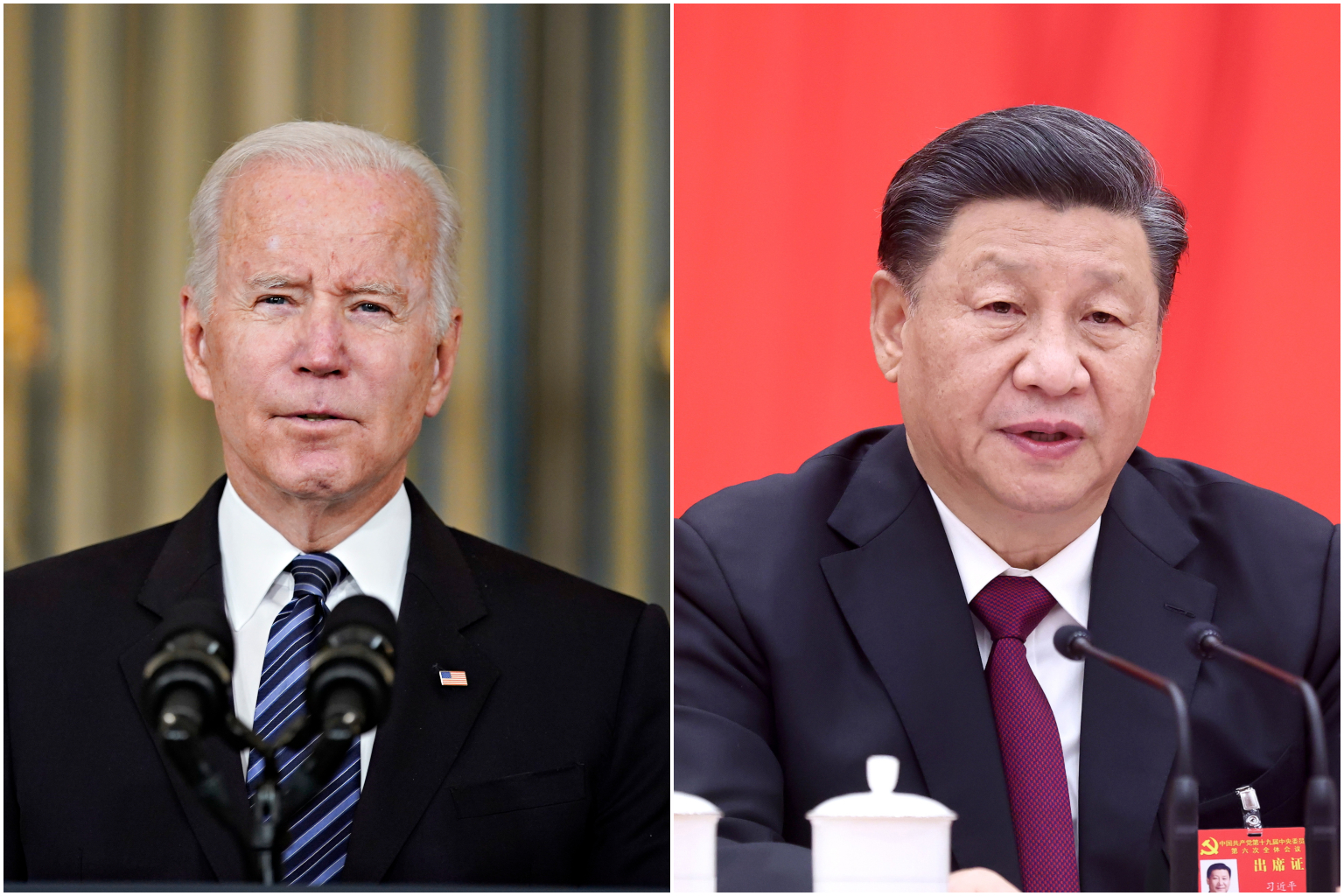Biden-Xi virtual summit: Value lies in managing tensions so don't expect breakthroughs, say experts
Sign up now: Get ST's newsletters delivered to your inbox

The meeting between US President Joe Biden and his Chinese counterpart Xi Jinping offers a chance for both leaders to underscore their positions on contentious issues.
PHOTOS: EPA-EFE
WASHINGTON - The meeting between US President Joe Biden and his Chinese counterpart Xi Jinping on Monday (Nov 15) is a chance to manage the superpowers' tensions so they do not spiral out of control, but major announcements are not expected, said foreign policy watchers.
Instead, the summit offers a chance for both leaders to underscore their positions on contentious issues, while staying in contact with each other.
"Expectations should be low for concrete outcomes from the Biden-Xi meeting," Eurasia Group China analyst Neil Thomas told The Straits Times.
"The meeting will try to put a floor under deteriorating US-China relations and signal that the two governments are committed to high-level dialogue and advancing some limited degree of cooperation on international issues of mutual concern," he added.
Veteran diplomat Paul Haenle and research analyst Nathaniel Sher of the Carnegie Endowment for International Peace think-tank said that high-level diplomacy between Mr Biden and Mr Xi is especially important because mid-level and lower-level dialogues have yielded little progress so far.
"Exchanges between heads of state will not resolve all the issues in the US-China relationship, but they can help to stabilise relations and prevent unintended outcomes," they wrote in a commentary on Wednesday.
Secretary of State Antony Blinken and National Security Adviser Jake Sullivan's Alaska meeting in March with China's top diplomat Yang Jiechi and Foreign Minister Wang Yi was notable for its acrimony, with each side airing a litany of complaints about the other.
Monday's virtual summit will be the two leaders' first video meeting since Mr Biden took office in January, following two phone calls on Sept 9 and Feb 10.
They have previously hosted each other on mutual visits when they were vice-presidents of their countries, however.
Professor David Lampton, director of China studies at Johns Hopkins University's School of Advanced International Studies, said he expected a better tone between the two presidents on Monday than was the case in previous lower-level meetings in Anchorage and Tianjin this year.
When Deputy Secretary of State Wendy Sherman met Mr Wang and other Chinese leaders in Tianjin in July, they also traded barbs. Vice-Foreign Minister Xie Feng said the United States was treating China like "an imaginary enemy", while Ms Sherman raised a range of concerns with China, from foreign media access to its cooperation with an investigation into Covid-19's origins.
"For the first time, the two presidents have a modest positive step about which they can come together - the Glasgow agreement to cooperate on climate change," Prof Lampton told ST, referring to the superpowers' pledge on Wednesday to cut methane emissions and phase out coal.
"This said, the Biden-Xi interaction will not fundamentally change the direction of bilateral relations. Neither side is ready to make fundamental changes, with Xi needing to look muscular in anticipation of next year's party congress and Biden needing every anti-China vote in the 2022 and 2024 elections," he added.
Prof Lampton said the meeting offered a channel of communication that the leaders could use to rein in crises if subordinates went too far, or if a true crisis emerged.
"Loss of control in the Taiwan Strait is an example of a high-risk contingency requiring communication at the top level," he said.
Eurasia Group's Mr Thomas said there was value in maintaining high-level dialogue between Washington and Beijing.
"Such communication helps both sides gain a clearer understanding of possibilities for bilateral cooperation and where the other stands on hot-button issues, which reduces the likelihood of miscalculations that could escalate into a broader crisis or even conflict," he said.
"This virtual meeting should help to stabilise bilateral ties, but strategic competition is here to stay because the two sides have intractable disagreements on key issues like democracy, markets and Taiwan," he added.
The White House has said it wants to set "guardrails and parameters" to prevent its competition with China from veering into conflict, while Beijing has said it wants to get their relationship back on the right track.
In a statement announcing Monday's summit, press secretary Jen Psaki said Mr Biden "will make clear US intentions and priorities and be clear and candid" about America's concerns with China.
Announcing the virtual meeting that will be held on Tuesday morning Beijing time, Chinese Foreign Ministry spokesman Hua Chunying said on Saturday that the two leaders will exchange views on bilateral ties and issues of common concern.
Mr Jacob Stokes, a fellow at the Centre for a New American Security, said in a commentary on Friday after the summit's announcement: "Standing up for US and allied interests and values while keeping simmering tensions from boiling over will be the order of the day when Biden talks to Xi on Monday night."
Mr Biden is expected to "convey in frank terms continued, firm US opposition" against China's assertiveness towards Taiwan, its human rights abuses in Hong Kong and Xinjiang, and its unfair trade practices, among other issues, said Mr Stokes, who focuses on US-China relations.
"At the same time, Biden will likely reiterate that while the United States expects the two powers to remain engaged in a 'stiff' strategic competition for the indefinite future, that fact need not lead to confrontation or conflict," he added.
China, for its part, will want tariffs on its goods and restrictions on its companies and citizens to be lifted.


